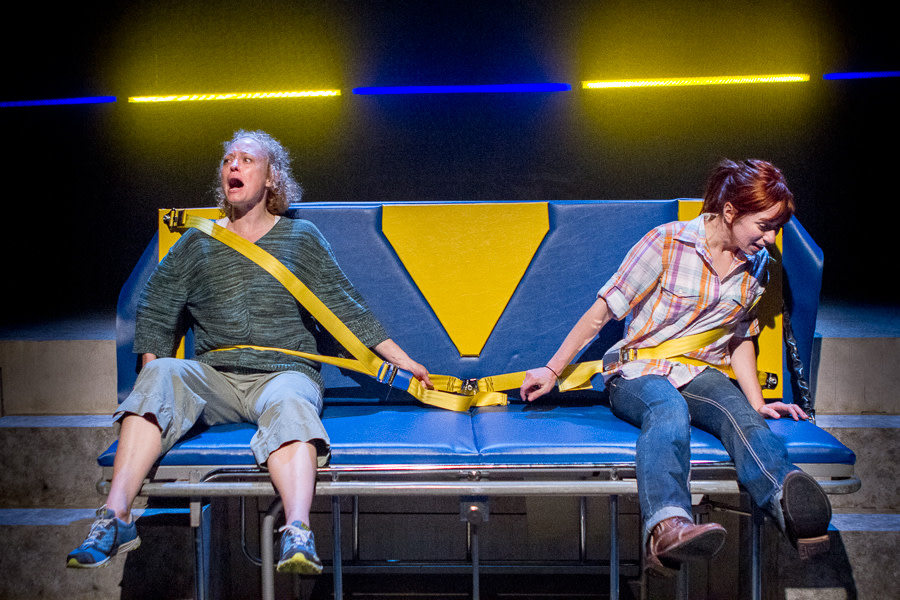Review: Artists Rep’s ‘Ithaka’

Dana Millican and Danielle Purdy in 'Ithaka'
Image: Owen Carey
Normally, when I review a play, I start by thinking about the work's universal theme—the idea at its heart with which I and other audience members connect. But in Ithaka, Artists Repertory Theatre's new, world-premiere production, there is not—cannot be—such an idea.
After all, the play, commissioned by Artists Repertory Theatre and written by local playwright Andrea Stolowitz, is all about veterans' re-entry into civilian society, and one of the main reasons that that re-entry, currently being experienced by thousands upon thousands of vets from the Afghanistan and Iraq wars, is so difficult is that there is this yawning, seemingly unbridgeable gap between soldiers' experiences in war zones and civilian life here at home. With Ithaka, Stolowitz seeks to help close that gap, if only a little; she succeeds not only in that, but also in creating an artfully crafted and socially relevant piece of theater.
The veteran at the center of Ithaka, Elaine (Dana Millican), is probably a lot like many veterans now returning from the Middle East. The former Marine captain is having a hard time adjusting to almost every aspect of civilian life: She is emotionally estranged from her loving, concerned husband. She doesn't like her old friends anymore. The things people do and talk about, from going to the movies to ice skating at the mall, seem, in her words, like “bullshit.” And, like far too many vets these days, Elaine is suffering from post-traumatic stress disorder, despite having gotten that box checked off in her exit interview.
The first few scenes of Ithaka are, truth be told, a bit Lifetime-y. As her husband stands by wringing his hands, Elaine breaks down into sobs, breaks out into inappropriate laughter, and generally behaves as we've been told people with PTSD do. This part of the play isn't inaccurate, but the story it tells about this terrible disorder is one we've heard before, and it doesn't help us understand vets' experiences in a deeper, truer way.
Fortunately, things then get weird.
After she passes out on her kitchen floor one night, Elaine is awoken by her old Marine buddy Eve (Danielle Purdy). She's just been processed out of the service, Eve tells Elaine, and she wants to do something they often talked about overseas: take a road trip to Eve's favorite place in the world, the Desperado roller coaster in State Line, Nevada. The two head to the desert, but no sooner have they arrived than the trip takes a dark turn, transforming, for Elaine, into an Odyssean voyage homeward. Like Odysseus, who had to pass through crucibles such as the singing of the Sirens to return to his home island of Ithaka, Elaine must confront and triumph over various unworldly beings to get back home in body and spirit.
Stolowitz's concept of telling Ithaka's modern-day story through the framework of Homer's epic poem is ingenious, turning what easily could have been a rerun after-school special into a resounding myth, at turns strange, comical, and frightening. The playwright, who won an Oregon Book Award this year for an earlier drama, Antarktikos, interviewed more than 20 veterans at the Portland Veterans' Center to make sure she got her portrayal of life in the military, and life post-military, right. At least to this civilian reviewer, Stolowitz's extensive research appears to have paid off; the play feels well informed, attentive to detail, and sophisticated in its depiction of vets.
Dana Millican, best known for her work in local Shakespeare productions, gives a Bard-worthy performance in the very contemporary, and very demanding, role of Elaine. She has help from Danielle Purdy, who does double duty as Eve and Elaine's missing cat and plays both roles with wisdom and humor. Victor Mack also deserves praise for his brief yet powerful turn as Jacob, a worldly-wise hospital orderly.
Ithaka
Artists Repertory Theatre
May 28–June 30
Artists Rep's staging, under the direction of Gemma Whalen, takes risks and reaps the rewards. Composer/sound designer Rodolfo Ortega's contemporary rock and pop soundtrack is unusual, yet fittingly unpretentious. Ortega and lighting designer Jeff Forbes's use of light and sound, meanwhile, is ambitious but successful, from little things, like the sound of tires on road as Elaine and Eve drive, to bigger ones, like the shocking flash-boom of mortar fire.
As effectively as Stolowitz conveys veterans' struggles, those of us who haven't served can't really know what it's like for them. But perhaps Ithaka does have a universal theme after all. Not all of us have been to war, but we have all, in some sense, strayed, gotten lost, forgotten the way back to Ithaka. Stolowitz's message, to vets and the rest of us, is one of hope: you can go home again.




